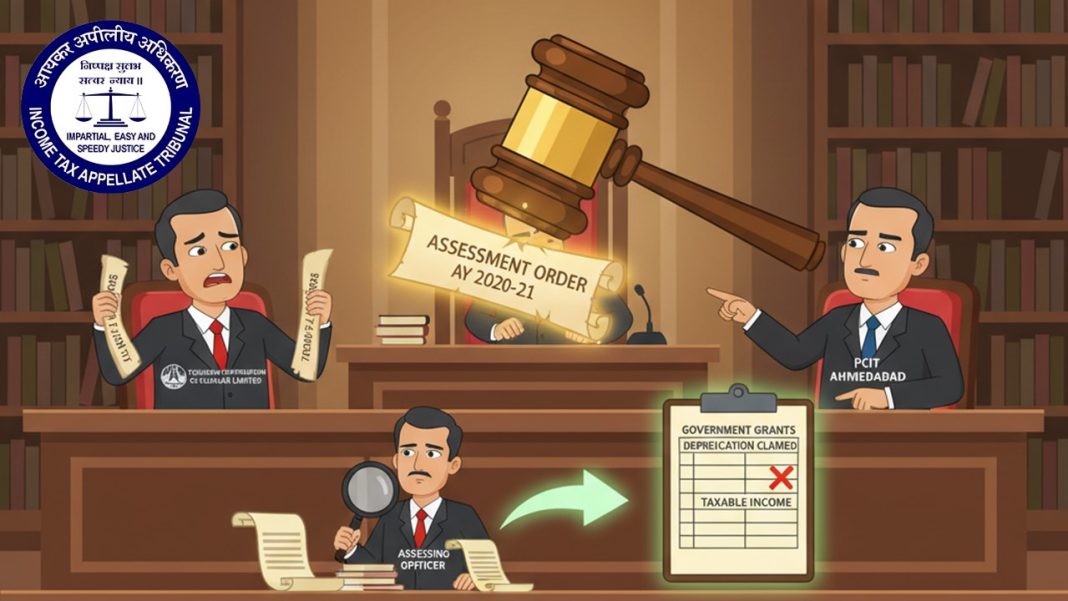ITAT: Excess Depreciation on Govt-Funded Assets Triggers Fresh Tax Assessment
The present appeal (ITA No: 1275/Ahd/2025) has been filed by Tourism Corporation of Gujarat Limited (Appellant) against the PCIT Ahmedabad in the Income Tax Appellate Tribunal Ahmedabad “B” Bench before Dr Brr Kumar, Vice President, and Shri Siddhartha Nautiyal, Judicial Member. The case was heard on 15/09/2025.
Tourism Corporation of Gujarat Limited had filed its Income Tax Return (ITR) for the Assessment Year 2020-21, declaring an income of around Rs. 36.03 crore. The Income Tax Department accepted this return without any changes through an assessment order passed under Section 143(3) read with 144B of the Income Tax Act on September 16, 2022.
But, later on, the Principal Commissioner of Income Tax (PCIT) again reviewed the case under the Principal Commissioner of Income Tax (PCIT) under Section 263 of the Income Tax Act. During the assessment, the PCIT noted that the taxpayer received government grants during the relevant period, which were credited to a deferred government account instead of being reduced from the cost or written-down value of the relevant block of assets. The company credited these grants to a “Deferred Government Grant Account.” Then, each year, it transferred a small portion from this deferred account to its profit and loss account as amortisation (a way of recognising income gradually).
The meaning of this method is that the company claimed depreciation on the full value of the assets (without reducing the grant amount); however, only a small portion of the grant was offered as income. Therefore, more depreciation was claimed than what should have actually been claimed, which decreases the taxable income.
Therefore, PCIT quashed the assessment order under Section 263 and remanded the case to the assessing officer for fresh assessment and instructed them to give the assessee a proper hearing, check and verify the grants received, amortised amounts, and depreciation claims, and pass a new reasoned and legal order.
Assessee’s Objections in the Appeal
The company (assessee), dissatisfied with the order of PCIT, further challenged the decision of PCIT by filing an appeal before the Income Tax Appellate Tribunal (ITAT) and raised two main arguments:
The assessee challenged the PCIT’s decision by filing an appeal before the Income Tax Appellate Tribunal (ITAT), raising mainly two key arguments:
- The show cause notice (SCN) issued by PCIT talked about the assessment year 2017-18, but the final order issued talked about the assessment year 2020-21, which is a violation of natural justice. Hence, the company said, they weren’t awarded a proper chance to respond.
- The company said the grant in question was received in FY 2016-17, not in FY 2019-20. The assessee had consistently followed the same accounting method (amortising over years). Depreciation was claimed correctly on the asset block as per income tax rules. Since the assets were added to the block of assets in 2016-17, and the block system does not allow adjusting WDV later for grants, there was no mistake in the 2020-21 assessment. Any change now would lead to double taxation of the same grant income.
Final Outcome
- When the matter was taken to the ITAT, the authority dismissed the appeal of Tourism Corporation of Gujarat Ltd. and upheld the PCIT’s order under Section 263. Meaning, the original assessment order for the assessment year 2020-21 is quashed.
- The case has been remanded to the Assessing Officer (AO) for a fresh assessment; the AO will now examine the treatment of government grants properly.
- The assessee will have a chance to submit documents and arguments during that reassessment.
Citation: Tourism Corporation of Gujarat Limited Vs PCIT Ahmedabad (ITAT Ahmedabad); ITA No: 1275/Ahd/2025; 01/10/2025; 2020-21



